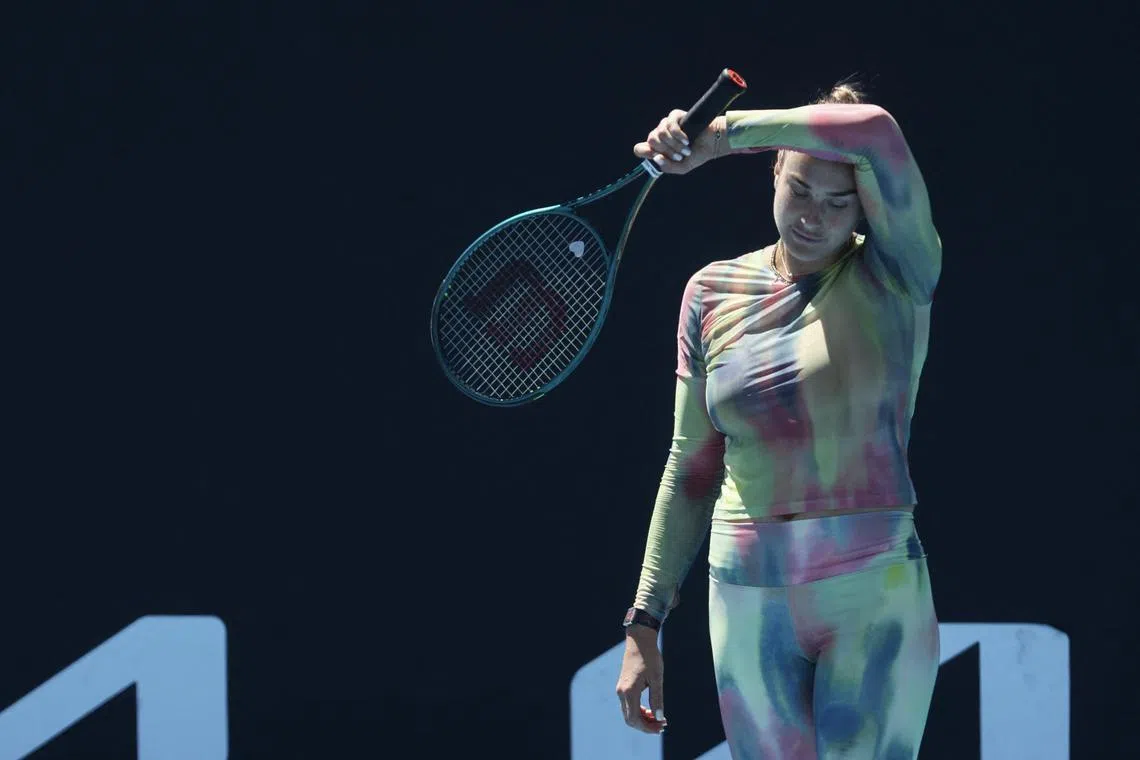The complete player in search of history against the teen prodigy turned Melbourne finalist at 29
Sign up now: Get ST's newsletters delivered to your inbox

Belarus' Aryna Sabalenka takes part in a practice session on day thirteen of the Australian Open tennis tournament.
PHOTO: AFP
Follow topic:
MELBOURNE – Aryna Sabalenka, who can write her name into the tennis record books with a third consecutive Australian Open title on Jan 25, has become the complete player.
The 26-year-old Belarusian is a commanding presence on court, a far cry from the talented but mentally fragile player of her younger days.
A second Melbourne title in 2024, married with a first US Open crown, established her as the dominant force in the women’s game.
She deposed five-time Slam champion Iga Swiatek at the top of the rankings and consolidated it this week by reaching another Major final, the fifth of her career.
Already the first woman to mount a successful title defence at Melbourne Park since compatriot Victoria Azarenka in 2013, she can etch her name among the greats by making it a hat-trick when she faces Madison Keys in the final.
She is the first woman to reach three consecutive Australian Open finals since Serena Williams in 2017 and the youngest to do so since Martina Hingis in 2002.
She is also just the third player in the past decade to notch a 20-match winning streak at a single Grand Slam.
If she wins again on Jan 25, will become the first woman since Hingis in 1999 to win the Australian Open three years in succession.
That would add her name to a select group of tennis greats who have completed the Melbourne three-peat.
The others are Margaret Court, Evonne Goolagong, Steffi Graf and Monica Seles.
“That’s crazy that I was able to put myself in the situation where I have a chance to put my name next to the legends,” said Sabalenka, who now has 18 WTA titles.
“I mean, I couldn’t even dream about that. It’s going to mean a lot for me.”
But, just three years ago at the Australian Open, Sabalenka’s serve had been in pieces and she was having to scrape through fraught battles as her fragile emotions were laid painfully bare.
Her dramatic change was a reward for hard work with her coaches and a sports psychologist, which has given her a zen-like peace while she has lost none of her fierce competitive instinct.
The freedom she now feels after banishing the mental demons has given her more than one way to win, and that is dangerous for her rivals.
She said: “Of course, I have tactics. But I follow my instincts most of the time, so it’s kind of like a balance.”
Meanwhile, Keys is enjoying a renaissance, having reached a second Grand Slam final eight years after her first in New York.
Now ranked 14th, she will return to the top 10 for the first time since 2019. The 29-year-old made her first semi-final at Melbourne Park in 2015 as a 19-year-old.
Keys ended her season early in October and married her coach, Bjorn Fratangelo, a month later.
The two players had been dating since 2017 and Fratangelo became her coach in 2023.
“I think she’s nowhere near her full potential,” added Fratangelo, a fellow American who won the boys’ singles at the 2011 French Open.
“Sharpening the axe can get you so far, but sometimes you just need new tools. I think that’s what I’ve tried to bring to the table.
“I just thought: OK, if we make a few changes and some subtle tweaks... then all of a sudden you’re in the mix, like she is now.” AFP

